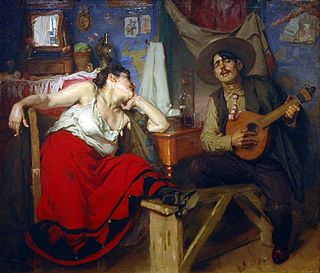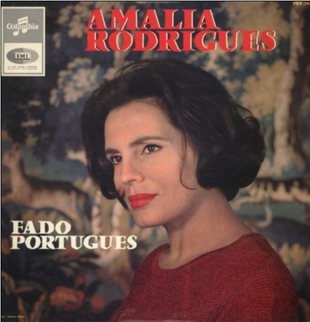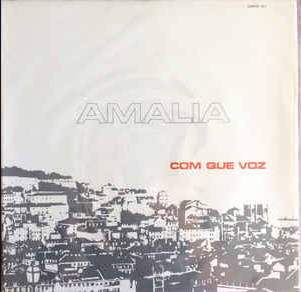Related Research Articles

Fado is a music genre that can be traced to the 1820s in Lisbon, Portugal, but probably has much earlier origins. Fado historian and scholar Rui Vieira Nery states that "the only reliable information on the history of fado was orally transmitted and goes back to the 1820s and 1830s at best. But even that information was frequently modified within the generational transmission process that made it reach us today."

Portuguese music includes many different styles and genres, as a result of its history. These can be broadly divided into classical music, traditional/folk music and popular music and all of them have produced internationally successful acts, with the country seeing a recent expansion in musical styles, especially in popular music.

Carlos ParedesComSE was a virtuoso Portuguese guitar player and composer. He is regarded as one of the greatest players of Portuguese guitar of all-time.

The Portuguese guitar or Portuguese guitarra is a plucked string instrument with twelve steel strings, strung in six courses of two strings. It is one of the few musical instruments that still uses watch-key or Preston tuners. It is iconically associated with the musical genre known as Fado, and is now an icon for anything Portuguese.

Alberto Valentim do Carmo Neto is a Brazilian football coach and former player who played as a right back.

Esta Voz que me Atravessa is the second album by Portuguese fado singer Mafalda Arnauth. It was released in 2001 by EMI Valentim de Carvalho. In praise of this album, Andreas Dorschel writes: "capable of the tenderest nuances of voice, she [Mafalda Arnauth] ingeniously counterbalances them with a roughness that calls to mind fado’s subcultural origins.“

Katia Guerreiro is a South African-born Portuguese fado singer, who has released eight albums and has received several awards, including Order of Arts and Letters, Chevalier rank, from the French government and the Order of Prince Henry from the President of Portugal.
Rouxinol Faduncho is a Portuguese fictional character created by the singer and comedian Marco Horácio. He's a personification of the typical Portuguese man, similar to a Zé Povinho living in the 21st century. He has recorded two CDs, the first named "Grandes Êxitos de Rouxinol Faduncho", launched on 5 December 2005. As he had "already fooled everyone with the first CD", he decided to launch a second one, named "Best On". Both CDs have songs featuring him as the singer, Paulo Valentim (guitarist) playing the Portuguese guitar, João Maria Veiga playing the guitar and Rodrigo Serrão playing the acoustic bass guitar.

Galo da Madrugada is a carnival block from Recife, Brazil. The block was created in 1978 by Enéias Freire. Galos parades every Saturday of carnival at São José (Recife) neighborhood. The main rhythm is the frevo, but other rhythms are also played.

Paulo de Carvalho is a Portuguese singer.
Armando Artur da Silva Machado was a Portuguese fadista, guitarist and "viola" player, meaning the viola caipira guitar. He performed with his wife Maria de Lourdes Machado, a nurse who became an accomplished Fado singer. In 1937 he opened the Adega Machado in Lisbon's Bairro Alto, which was the second fado bar in the bairro, but the first to give daily performances.
Joaquim Viana Pimentel was a Portuguese Fado singer, who made his career as "ambassador" of the fado in Brazil, where he became popular and was called "the prince of Portuguese song."

Gisela Joao Gomes Remelho is a Portuguese fado singer.
Fado is a genre of Portuguese song

Sonia Shirsat is a Fado singer from Ponda taluka, Goa, India. She has been referred to as "the ambassador of Goan music to the world" and has performed across India and the world and often during cultural and music events in Goa. She sings in 13 different languages Shirsat has been promoting Fado in Goa, by holding training and introductory classes to this form of music at various parts of the region.

Fado Português is a fado album recorded by Amália Rodrigues and released in June 1965 on the Columbia label. The album was recorded the Valentim de Carvalho de Paço de Arcos studios. Amália was accompanied by musicians Domingos Camarinha on Portuguese guitar and Castro Mota and Martinho d'Assunção on viola. The cover photograph was by Augusto Cabrita. Eight of the 12 tracks on the album were written by Alain Oulman.

Vou Dar de Beber à Dor is a fado album recorded by Amália Rodrigues and released in 1969 on the EMI and Valentim de Carvalho labels. Amália was accompanied by musicians Domingos Camarinha on Portuguese guitar, Castro Mota on viola, and by Raúl Nery's guitar ensemble. The songs were recorded at Valentim de Carvalho de Paço d'Arcos studios. The album cover features a photograph by Augusto Cabrita.

Com Que Voz is a fado album recorded by Amália Rodrigues in January 1969 and released in March 1970 on the EMI and Valentim de Carvalho labels. It reached No. 1 on the Associação Fonográfica Portuguesa (AFP) chart in Portugal. Amália was accompanied on the album by Pedro Leal on viola and José Fontes Rocha on Portuguese guitar.
References
- ↑ Portal do Fado - Guitarrista Paulo Valentim "24 fev. 2011 – O guitarrista Paulo Valentim toca no dia 12 de março em Macau com a Orquestra Chinesa do território fados portugueses para os quais fez"
- ↑ Richard Elliott Fado and the Place of Longing: Loss, Memory and the City Page 37 2010 "59 'Romper Madrugadas', lyric by Paulo Valentim, music by Paulo Valentim & Joao Veiga, recorded by Katia Guerreiro, Nas Maos do Fado (Ocarina OCA 007, 2003).